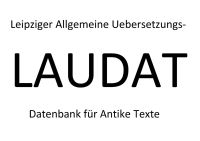LAUDAT – Leipzig Database for Translations of Ancient Texts
The translation of literary texts poses one of the most intensive and impactful forms of reception. The process of translation itself is complex in terms of language, method, form and content and often produces the first interpretation of the source text.
When it comes to ancient literature, translations perform an important function by making Greek and Latin texts accessible to the general public in the first place. In order to exhibit the abundance of translations of ancient texts and facilitate their use, the LAUDAT database project documents and systemises translations of ancient texts and provides access to them (insofar as technically and legally possible).
The database focuses on translations of ancient texts from Greek and Latin into German produced since ca. 1800. The project aspires to include translations of ancient texts into other modern languages in the future; for the time being, platforms such as TLG or Perseus already provide acess to translations into English.
The target audience of the LAUDAT database project includes researchers and teachers at schools and universities (for example in classical philology, ancient history, theology, religious studies, philosophy, archaeology, modern literary studies, cultural studies, education, and reception studies, but also medicine and psychology) as well as interested members of the general public. Our hope is to document and make more easily accessible the large number of older translations, some of which have fallen into oblivion (such as Gustav Schwab's translation library or his 'Dichter des Alten Griechenland', published in 1835 in the series 'Bibliothek für die weibliche Jugend'), along with the flurry of new translations, some of which have appeared in hard-to-find places or been printed by lesser- known publishers.
The large database 'Deukalion', which was created between 2005 and 2016 as part of Collaborative Research Centre 644 ('Transformations of Antiquity') and which contains extensive qualitative information on many translations of ancient texts (including, e.g., stylistic characteristics), will also be integrated. To ensure prompt access, the Deukalion database, hitherto not open to the public, will initially be made available separately and will be integrated into LAUDAT over time. We would like to thank those responsible at the Humboldt University of Berlin (namely Ulrich Schmitzer, Josefine Kitzbichler and Roland Baumgarten) for their cooperation in this respect.
LAUDAT is motivated by the vision of making ancient texts more accessible beyond classical philology and the ancient languages. This aspiration extends to the involving academic teaching methodologies and ancient languages as school subjects, which continue to be an important area in language teaching. In these contexts, translations have (once again) become increasingly important, despite the fact that translations of ancient texts (and their use in classrooms) have often been met with certain reservations in the German-speaking world. Such concerns are motivated by the old question of whether translations of literary texts serve as deterrents to reading these texts in the original language, or whether translations provide the possibility of accessing such literary texts in the first place (or at least makes accessing them much easier). At LAUDAT, we are convinced that these options are often not mutually exclusive. Accordingly, the LAUDAT database project aims at facilitating and thus promoting the study of ancient texts and their rich reception in countless modern literatures and forms, which continues to this day. The inclusion of the database in the 'Propylaeum' information service for ancient studies is intended to emphasise this aspiration.
Finally, a brief comment on the working title of the project: LAUDAT stands for “Leipziger Allgemeine UebersetzungsDatenbank für Antike Texte”, based at the Institute of Classical Philology and Comparative Studies at Leipzig University). At the same time, the name alludes to the aspect of 'naming, citing, quoting' inherent in the Latin verb laudare, which is indeed the actual aim of LAUDAT: to systemise and display the wealth of available translations of ancient texts in a freely accessible database.



